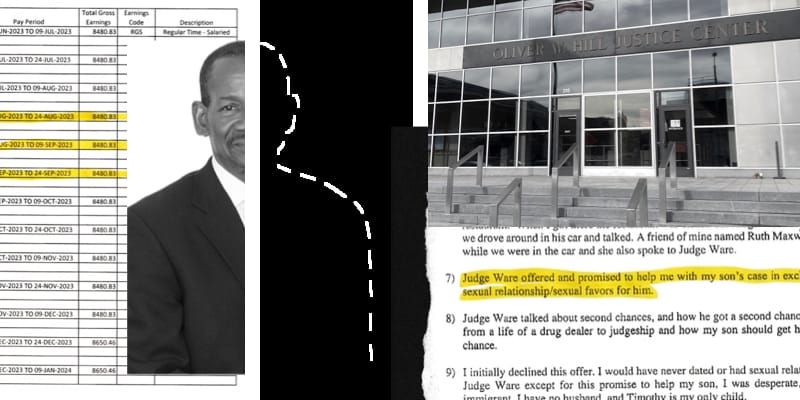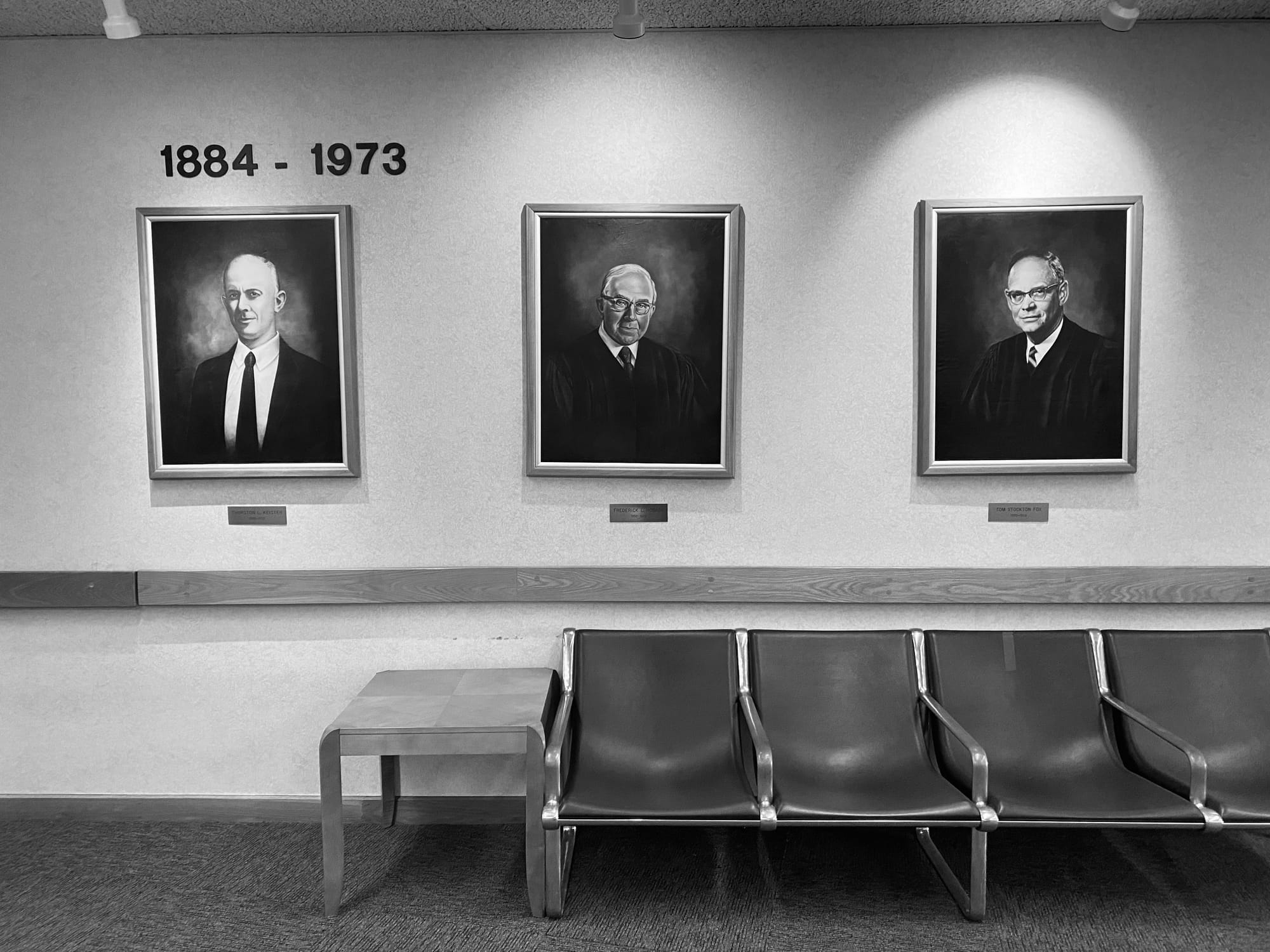The Case of the Missing Judge
Onzlee Ware has been absent since a woman alleged he traded legal aid for sex. Nobody will say why, and he’s still getting paid.

One day in September, Onzlee Ware stopped showing up for work.
The Roanoke City Circuit Court judge has not appeared on the bench since shortly after a woman alleged in court records that he gave her legal help in exchange for sex, according to numerous people who work at the courthouse.
Yet Ware continues to receive a regular state salary — $8,480.83 every two weeks, payroll records show.
So why is Ware gone? No public official will explain his absence.
The court system’s public relations office says it doesn’t know. Neither do members of the General Assembly, who appoint judges. And Virginia’s Judicial Inquiry and Review Commission, which has the power to discipline judges, isn’t talking.
The case of Ware’s disappearance illustrates the prevailing secrecy and lack of public accountability in situations where Virginia judges are accused of wrongdoing.
For several months now, all cases in Roanoke City Circuit Court’s have been handled by its two other judges, David Carson and Christopher Clemens, according to Commonwealth’s Attorney Don Caldwell. By email, Carson said he was “unable to make any comment on this particular subject,” and Clemens said he was “unable to speak about this pursuant to our Judicial Code of Ethics.”
Megan Rhyne, the executive director of the Virginia Coalition for Open Government, says it can make sense to keep certain deliberations under wraps since claims could be baseless or frivolous. Yet it’s hard for the public to make a determination if there’s no record of the complaints.
“Judges wield enormous power over us, and we as the public don’t have the ability to vote them out like we do our elected officials, when they no longer represent our interests,” Rhyne said in an email. “The public has a profound interest in holding judges accountable.”
A woman who answered the door at Ware’s home in Roanoke on Saturday said he was unavailable. She held a letter that The Rambler left there the day before, and said Ware would reach out if he wanted to.

'I was desperate'
Grace Church first met Onzlee Ware at a charity event about five years ago, court records say.
Church, who moved to Roanoke in the 1990s from Kenya, was in despair: Her son, Timothy Church, had been charged with murder in the 2018 killing of the manager of the Starlite Motel on Melrose Avenue.
Ware told Church to call him, and when they met by chance later at another community event, Ware asked why he hadn’t heard from her, according to Church’s allegations in court records, which The Roanoke Times first reported in September.
Thus began what Church described as a quid-pro-quo relationship that lasted from the summer of 2019 until the spring of 2020.
“Judge Ware offered and promised to help me with my son’s case in exchange for sexual relationship/sexual favors for him,” Church wrote in a signed declaration included in her son’s conviction appeal filed on Aug. 31. “I would have never dated or had sexual relations with Judge Ware except for this promise to help my son, I was desperate, I am an immigrant, I have no husband, and Timothy is my only child.”
Ware had been a judge at the Roanoke City Juvenile and Domestic Relations District Court since 2014; in March 2020, the General Assembly appointed him a circuit court judge. Ware had previously served in the House of Delegates as a Democrat since 2004.
Timothy Church’s trial was set to go before Clemens in September 2019. Ware advised Church to push for a trial by judge rather than jury, maintaining he was good friends with Clemens, according to court records.
That month, Clemens convicted Timothy Church of first-degree murder in the beating death of the motel owner, Ishvarlal Patel. Church reportedly used Patel’s baseball bat against him after Patel refused to loan him $20.
Before a July 2020 sentencing hearing, Ware encouraged Church to drop her son’s defense attorney, Dirk Padgett, so that Clemens could appoint attorney Patrick Kenney, court records say.
She did so, and Clemens appointed Kenney. Ware promised Church her son would get a sentence of less than 7 years in prison, “because of his close relationship with Judge Clemens,” Church’s allegation says. “This was a theme he maintained throughout our sexual encounters at his house. I had to have sex with him first in each encounter with him.”
Church said she had sex with Ware “at least 10 times between June 2019 and May 2020,” according to court records. “Each time was only because I was desperate to save my son and Judge Ware convinced me that he would help.”
At the sentencing hearing, Church testified that her son suffered from mental health issues, and that he was in a drug-induced psychosis during the attack. Church’s declaration says Ware coached her on what to say.
In the end, Clemens imposed a sentence of life in prison, which would be suspended after he served 40 years.
“When my son Timothy got sentenced to life I realized Judge Ware had not helped my son like he had promised,” Church said in court filings. “I felt cheap, used, wasted, I did not want to continue living anymore, the pain was too much to bear.”
Court records include a photo of Ware and Church together; a note calling Church a “beautiful and compassionate woman” signed “forever Onzlee”; and a text message allegedly from the judge.
In September 2021, the Supreme Court of Virginia denied Timothy Church’s appeal. Afterward, Church worked with Roanoke defense attorney Rob Dean on reviving an appeal.
But early last August, The Roanoke Times revealed in a front-page article that Dean agreed to give up his law license amid a Virginia State Bar investigation into alleged inappropriate sexual relationships with clients. Dean acknowledged the complaints, one of which involved offers of cash and gifts in exchange for sexual favors.
That transgression triggered Church into going public with her allegations, according to Bernadette “BJ” Lark, a Roanoke advocate who has helped Church navigate the legal system.
Church’s allegations are included in Timothy Church’s writ of habeas corpus, a court filing that alleges wrongful imprisonment. The court records say Timothy Church had no knowledge of his mother's relationship with Ware and was denied effective legal representation and the right to a jury trial, in part based on Ware’s advice.
Roanoke’s judges have recused themselves from the matter. Richard Moore, a retired judge from Charlottesville, has been appointed to oversee the case.
“I think realistically it might be January or even February before we can set anything,” Moore wrote in an October letter to attorneys.
The first court hearing has yet to be scheduled.

'A black box of information'
It’s been more than four months since Ware appeared in court.
Last week, the clerk’s office overseeing Circuit Court cases referred questions about the judge’s whereabouts to Ware’s clerk. That clerk referred questions to the public relations division of the courts’ Office of the Executive Secretary.
“You ask several questions about Judge Ware that this Office is unable to answer,” Alisa Padden, director of legislative and public relations, said in an email when asked about Ware’s absence. “We are aware that it has been publicly reported that Judge Ware last appeared in court in September, 2023; however our office has no first-hand knowledge of this.”
Padden released the judges’ payroll records in response to a Rambler public records request. They show biweekly payments of $8,480.83, described as “Regular Time - Salaried” over the past six months, with the most recent check issued on Jan. 16.
But Padden could not answer why Ware has stopped hearing cases or who made that decision.
“Judge Ware is a judge of the 23rd Judicial Circuit of Virginia,” she wrote. “Judges are elected by the General Assembly and this office does not have supervisory authority over them.”
One state agency does have oversight over judges: the Judicial Inquiry and Review Commission.
Raymond Morrogh, an attorney for the commission, said state law forbids him from answering questions about why Ware hasn’t been in court.
“I am constrained by the statutory regime that governs the Commission’s operations with respect to commenting upon any specific matter that may be before the Commission,” Morrogh wrote in an email. “As a consequence, I am not able to provide you with any information that would confirm the existence of a matter before the Commission, or the absence of the Commission's consideration of any particular judge.”
Created by the General Assembly in 1971, the commission is tasked with investigating claims of judicial misconduct or severe mental or physical disability. Only if the seven-person board finds a complaint valid and serious enough to warrant censure or removal would it become public through a filing to the Supreme Court of Virginia.
State law says that in a pending investigation, the commission “may suspend a judge with pay if it finds that there is probable cause to believe that the continued performance of judicial duties by the judge constitutes both a substantial and immediate threat to the public interest in the administration of justice.”
Last year, Morrogh denied The Rambler’s public records request for any documents about Ware, noting that the commission is not subject to Virginia’s Freedom of Information Act.
The commission is only required to disclose data points. In its latest year-end report, dated Nov. 30, the commission said it received 524 complaints and dismissed 517 of them outright. Only in one case did commissioners conclude a judge had breached the Canons of Judicial Conduct, but there, too, the commission dismissed the complaint.
A 2023 state law required the commission to name any judge that it disciplined. But in that one case last year, the annual report says, commissioners made the determination on June 13 — just before the law took effect July 1. So they did not reveal a name.
In 2022, the commission received 415 complaints and dismissed 402 outright; of five cases where they concluded judges broke the rules, all were dismissed. The year prior, 371 out of 395 complaints were dismissed; of six cases where judges violated the rules, one case was not dismissed.
The Rambler also asked Roanoke Valley representatives in the General Assembly, as well as legislators who oversee judicial matters, if they could explain Ware’s absence.
“I have not been given any information regarding Judge Ware's presence or absence from the bench,” Sen. Scott Surovell, D-Fairfax, who chairs the Senate Courts of Justice Committee, said in an email. “The General Assembly is not normally given information about a judge's performance until they are up for re-election. Judge Ware will be eligible for re-election in 2028.”
Sen. David Suetterlein, a Republican representing Roanoke, said he does not have any definitive information about Ware.
“The Judicial Inquiry Review Commission remains a black box of information,” Suetterlein said in an email. “There have been conversations about making it more transparent but a consensus has remained elusive.”
The only sign of Ware’s presence in Roanoke Circuit Court recently came in the form of a deed of sale.
Earlier this month, Ware transferred ownership of his former Gainsboro law office at 325 Jefferson St.
Court records show Ware sold the old corner grocer building, assessed at $187,300, to Ivelmap Property Holdings for $72,000 cash.

